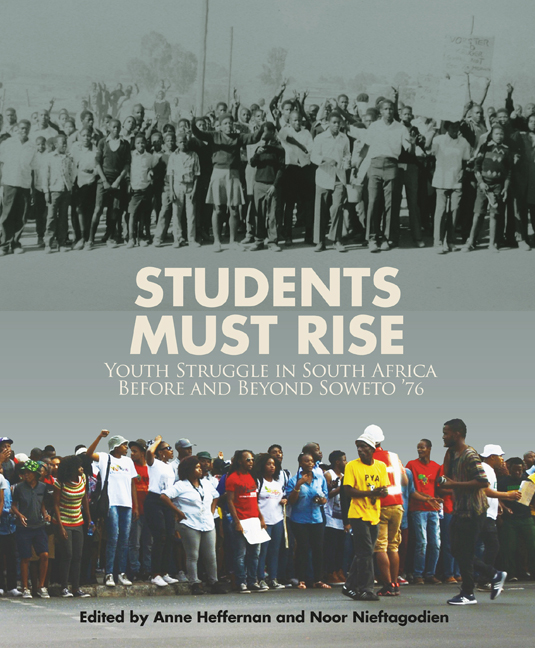Book contents
- Frontmatter
- Acknowledgements
- Contents
- Timeline
- Map Of South Africa
- Glossary
- Abbreviations
- Introduction: narratives of the student struggle
- Chapter 1 A brief history of the African Students’ Association
- Chapter 2 Youth and student culture: Riding resistance and imagining the future
- Chapter 3 The role of religion and theology in the organisation of student activists
- Chapter 4 Student organisation in Lehurutshe and the impact of Onkgopotse Abram Tiro
- Chapter 5 The University of the North: A regional and national centre of activism
- Chapter 6 Action and fire in Soweto, June 1976
- Chapter 7 What they shot in Alex
- Chapter 8 SASO and Black Consciousness, and the shift to congress politics
- Chapter 9 Youth politics and rural rebellion in Zebediela and other parts of the “homeland” of Lebowa, 1976–1977
- Chapter 10 My Journey, our journey: Activism at Ongoye University
- Chapter 11 ‘Let's begin to participate fully now in politics’: Student politics, Mhluzi township, 1970s
- Chapter 12 ‘They would remind you of 1960’: The emergence of radical student politics in the Vaal Triangle, 1972–1985
- Chapter 13 The ends of boycott
- Chapter 14 Fighting for ‘our little freedoms’: The evolution of student and youth politics in Phomolong township, Free State
- Chapter 15 ‘Every generation has its struggle’: A brief history of Equal Education, 2008–15
- Chapter 16 Contemporary student politics in South Africa: The rise of the black-led student movements of #RhodesMustFall and #FeesMustFall in 2015
- Selected Bibliography
Chapter 14 - Fighting for ‘our little freedoms’: The evolution of student and youth politics in Phomolong township, Free State
Published online by Cambridge University Press: 21 April 2018
- Frontmatter
- Acknowledgements
- Contents
- Timeline
- Map Of South Africa
- Glossary
- Abbreviations
- Introduction: narratives of the student struggle
- Chapter 1 A brief history of the African Students’ Association
- Chapter 2 Youth and student culture: Riding resistance and imagining the future
- Chapter 3 The role of religion and theology in the organisation of student activists
- Chapter 4 Student organisation in Lehurutshe and the impact of Onkgopotse Abram Tiro
- Chapter 5 The University of the North: A regional and national centre of activism
- Chapter 6 Action and fire in Soweto, June 1976
- Chapter 7 What they shot in Alex
- Chapter 8 SASO and Black Consciousness, and the shift to congress politics
- Chapter 9 Youth politics and rural rebellion in Zebediela and other parts of the “homeland” of Lebowa, 1976–1977
- Chapter 10 My Journey, our journey: Activism at Ongoye University
- Chapter 11 ‘Let's begin to participate fully now in politics’: Student politics, Mhluzi township, 1970s
- Chapter 12 ‘They would remind you of 1960’: The emergence of radical student politics in the Vaal Triangle, 1972–1985
- Chapter 13 The ends of boycott
- Chapter 14 Fighting for ‘our little freedoms’: The evolution of student and youth politics in Phomolong township, Free State
- Chapter 15 ‘Every generation has its struggle’: A brief history of Equal Education, 2008–15
- Chapter 16 Contemporary student politics in South Africa: The rise of the black-led student movements of #RhodesMustFall and #FeesMustFall in 2015
- Selected Bibliography
Summary
Phomolong township, situated six kilometres from the small town of Hennenman in the Free State, has received increased scholarly interest following its experience of service delivery protests in 2005. Similarly, there has been a great deal of interest in young political mobilisation and collective action under apartheid. Particularly intriguing is the belated development of youth political mobilisation in the Free State and the varying reasons for this. It is argued here that the genesis of youth political organising in Phomolong can only be understood against the backdrop of the expansion of secondary schooling in the 1970s and 1980s. The permanent presence of a young generation of students at high school level was absent in this area until the late 1970s. In this absence of networks with established organisations, the “locality” became a critical space for politicisation. Far from being an easy exercise, challenging the powers of local authorities was a complex and contradictory process. The kinship-like relations with councillors, their entrenched presence in the area as revered “elders” and their location in the teaching profession meant that most of those who later opposed them had actually benefited from their tutelage at one point or another. Finally, the chapter argues that the emergence of a vigilante group – Bontate (the fathers) – comprised almost exclusively of fathers and older male relatives of the young activists confirms that youth political activity took a noticeable shape in the latter part of the 1980s.
Seekings and Twala pin the belated formation of youth political structures in the Free State on a number of realities including the population size of some of its townships at the time (only four townships boasted a population of more than 20 000 people), the relative isolation and disparate location of these townships with respect to one another, as well as their distance from urban areas that displayed decisive political mobilisation, particularly Johannesburg. Equally emphasised in the literature is the absence of educational institutions in the province that could be compared to Turfloop and Fort Hare as ‘incubators of organised dissent’. Unlike the relatively industrialised north-western part of the area, which is close to industrial centres like Sasolburg and boasts considerable strength in trade union organisation, the possibilities for political mobilisation in the southern Free State were limited by its overwhelmingly agricultural orientation.
- Type
- Chapter
- Information
- Students Must RiseYouth struggle in South Africa before and beyond Soweto ’76, pp. 157 - 167Publisher: Wits University PressPrint publication year: 2016



